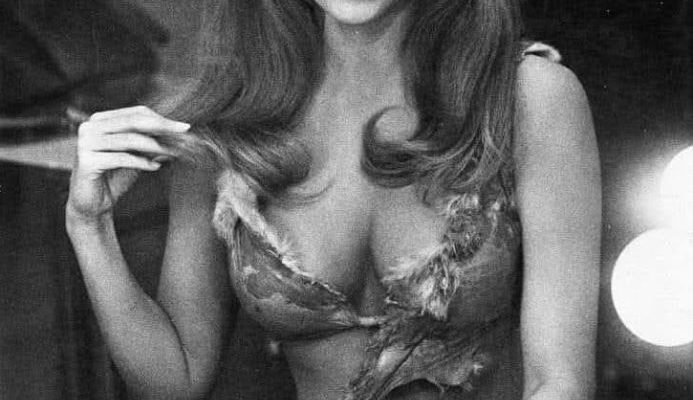Raquel Welch, born Jo Raquel Tejada on September 5, 1940, in Chicago, Illinois, rose to fame in an era when Hollywood was still defining its relationship with beauty, glamour, and female stardom. With her exotic looks—courtesy of her Bolivian father and American mother—Raquel stood out from the start. But behind the poster-girl image that would make her world-famous, Welch carved out a career marked by resilience, reinvention, and a fierce desire to be taken seriously as an actress.

Welch’s early life was shaped by ambition and determination. Her parents moved to San Diego when she was young, and she pursued ballet, winning teen beauty contests and eventually studying at San Diego State College on a theater arts scholarship. She married her high school sweetheart, James Welch, and took his surname, which she would famously keep throughout her career. After a short stint as a weather presenter and model, Raquel moved to Los Angeles with her two children in pursuit of acting opportunities.
Her big break came in 1966, when she was cast in Fantastic Voyage, a sci-fi adventure that exposed her to a wide audience. However, it was her role that same year in One Million Years B.C. that transformed her into a global icon. Dressed in a deerskin bikini with her windswept hair, Welch became a poster sensation. The image defined her public persona for years—an undeniable sex symbol.

But Welch was determined not to be boxed in. She often spoke of the frustrations that came with being typecast as a pin-up or exotic beauty. Hollywood in the 1960s and ’70s wasn’t particularly kind to women who challenged the mold, and Welch found herself battling a system that was reluctant to let her grow as a performer.
Despite this, she took on a variety of roles that showcased her range. She earned a Golden Globe Award for Best Actress in a Musical or Comedy for her performance in The Three Musketeers (1973), where she displayed a flair for comedy that surprised many.
She also appeared in films like Myra Breckinridge (1970), a controversial film in which she played a transgender woman—a bold move at the time—and Kansas City Bomber (1972), where she played a rough-and-tumble roller derby athlete. Welch was often criticized for these roles, but she saw them as necessary risks to push her beyond the stereotypical image that had been imposed on her.
In addition to acting, Welch became a savvy businesswoman. In the 1980s and ’90s, she released a series of health and beauty books and videos, promoting fitness and glamour at any age. Her signature wig line became immensely popular and remains a thriving brand even after her passing. Her ability to evolve beyond acting helped sustain her public presence and financial independence.
Raquel Welch also became known for her elegance and restraint. She was never the tabloid fixture that many of her contemporaries were. She avoided scandal, remained private about her personal life, and kept her focus on her work. Over her lifetime, she was married four times, and though none of the marriages lasted, she often stated that she preferred her independence and found contentment in solitude.
Later in her career, Welch appeared in television series such as Seinfeld and Spin City, often playing exaggerated versions of herself. She also appeared in Broadway’s Victor/Victoria in the 1990s, proving she had the theatrical chops to hold her own on stage. Her appearances were marked by professionalism and grace, often earning the admiration of younger generations of performers.

Despite the early fixation on her beauty, Welch’s longevity in Hollywood was not a fluke. It was the result of hard work, adaptability, and a refusal to be underestimated. Her journey reflects the challenges many women in entertainment face: being seen as more than their appearance and fighting for roles that respect their talent.
Raquel Welch passed away on February 15, 2023, at the age of 82. Tributes poured in from fans and celebrities alike, all acknowledging not just her beauty, but her trailblazing spirit and impact on the industry. She had redefined what it meant to be a sex symbol—elevating it with intelligence, wit, and independence.
Today, Raquel Welch is remembered as more than just the woman in the fur bikini. She is remembered as a performer who defied expectations, a businesswoman who understood her worth, and an icon who inspired countless women to embrace strength, beauty, and self-respect. Her life and career are testaments to perseverance in an industry that is often unforgiving, especially to women who dare to be more than what others expect.



